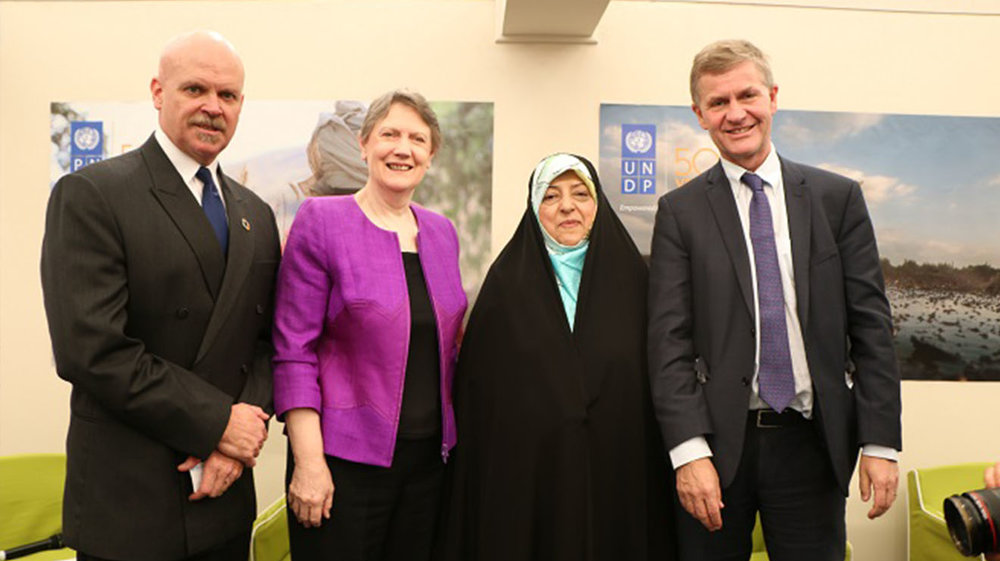UNDP, UN Environment hold sand and dust storm side event at COP22

TEHRAN — The United Nations Development Program (UNDP) jointly with the United Nations Environment held a side event on the sand and dust storms at Conference of the Parties (COP22) in Marrakech, November 7 to 18, 2016.
The event was held with UN resident coordinator in Iran Gary Lewis, UNDP Administrator Helen Clark, head of UN Environment Erik Solheim, and Iranian chief of Department of Environment (DOE) Masoumeh Ebtekar, as speakers.
The aim of the side event was to both raise awareness and serve as a call to action for West Asian countries to find a way to tackle this trans-boundary human development challenge.
Lewis as the event moderator underscored the economic, health and environmental impacts of sand and dust storms, emphasizing a growing emergence of international consensus on the matter in 2016.
Ebtekar, for her part, cited evidences and figures indicating sand and dust storms in Iran and the concentration of pollutants in various cities underlining the fact that at least three quarters of the particles are coming from neighboring countries.
In the past decade sand and dust storms have become major threats to the economy, health and the environment in many countries across a geographical swathe starting in northwest Africa and ending at Japan, she said, adding, the challenge is especially acute in the Middle East with Iran being among the most affected countries especially in its western reaches.
Some eight million hectares of land in Iraq are hot spots for sand and dust storms which haunt provinces of Khuzestan, Ilam, Kermanshah, and Kordestan for long periods, she regretted.
Noting the trans-boundary nature of SDS, she stressed the need for international environmental impact assessment of projects affecting water availability in the region emphasizing sand and dust storms are a peace and security issue.
Chief of DOE further urged global environmental funds such as Global Environmental Facility (GEF), Adaptation Fund, and Green Climate Fund to tackle the problem of sand and dust storms.
Mentioning the economic impact of dust storms which is at least US$13 billion yearly in lost GDP, UNDP Administrator Clark called for increased cooperation at the global and regional levels in four areas of developing early warning systems, and sharing climate and weather information which can be used to forecast sand and dust storms, promoting measures that mitigate the worst adverse health effects of sand and dust storms where and when they happen, scoping of effective preventive measures, and research.
Clark went on to say that “the United Nations development system can serve as a platform for such cooperation and UNDP itself has a global presence and commits to working closely with other agencies which can provide specialized inputs.”
Further UN Environment Head Solheim described sand and dust storms as a huge human, economic, health and environmental issue, noting that World Meteorological Organization (WMO) estimates 7 million people worldwide die prematurely every year due to air pollution.
Solheim referred to the past successes addressing environmental problems such as ozone depletion and acid rain and said that sand and dust storms can be addressed, but require coordinated political action in the region and underscored planting trees and building codes as keys to address the problem.
The need for collaborative action among countries in the Middle East was stressed by all speakers and the opportunity afforded by the UN to serve as a platform for such engagement was also recognized.
On the sidelines of her trip to Morocco, Ebtekar has also met with the Iraqi president Fuad Masum and discussed ways to mitigate the problem of sand and dust storms in collaboration with Iraq.
Masum stated that should they overcome their problems at hand (war and regional conflicts) and succeed in securing peace in their country they would be happy to help Iran to fight sand and dust storms.
MQ/MG
(Photo: From left to right: UN Resident Coordinator to Iran Gary Lewis, UNDP Administrator Helen Clark, DOE chief Masoumeh Ebtekar, and Head of UN Environment Erik Solheim)

Leave a Comment